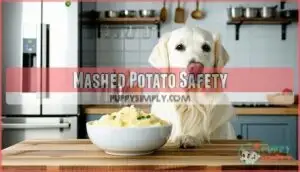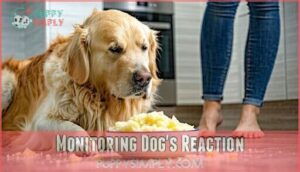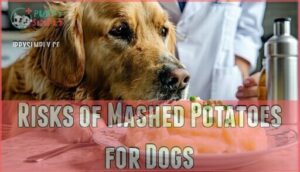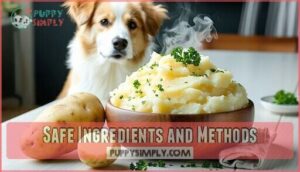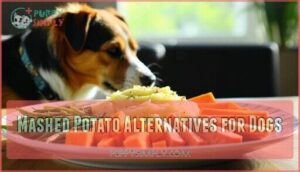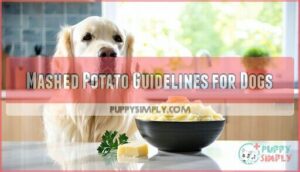This site is supported by our readers. We may earn a commission, at no cost to you, if you purchase through links.

You can safely share small amounts of plain, unseasoned mashed potatoes with your pup as an occasional treat. However, the usual suspects like butter, salt, garlic, and onions that make our mashed potatoes irresistible can actually make dogs sick.
Think of it as the difference between a safe snack and potential trouble brewing in their belly. Keep portions small since potatoes are high in carbs, and always skip the seasonings.
There’s more to know about preparation methods and which dogs should avoid them entirely.
Table Of Contents
- Key Takeaways
- Can Dogs Eat Potatoes
- Can Dogs Eat Mashed Potatoes
- Dog Diet Basics
- Mashed Potato Safety
- Feeding Mashed Potatoes to Dogs
- Mashed Potato Benefits for Dogs
- Risks of Mashed Potatoes for Dogs
- Preparing Mashed Potatoes for Dogs
- Mashed Potato Alternatives for Dogs
- Mashed Potato Guidelines for Dogs
- Frequently Asked Questions (FAQs)
- Can dogs eat mashed potatoes?
- Can dogs eat raw potatoes?
- Can dogs eat mashed sweet potatoes?
- Can dogs eat mash?
- Can dogs eat baked potatoes?
- Are mashed potatoes good for a dog?
- What happens if my dog eats a boiled mashed potato?
- Is it okay for dogs to eat butter?
- How much mashed potatoes can I give my dog?
- Are there any health benefits from giving my dog mashed potatoes?
- Conclusion
Key Takeaways
- You can safely give your dog plain, unseasoned mashed potatoes as an occasional treat, but avoid butter, salt, garlic, and onions which can make dogs sick or cause serious health problems like anemia and pancreatitis.
- Keep portions small based on your dog’s size – teaspoons for small dogs, tablespoons for large dogs – and limit treats to once or twice weekly since potatoes are high in carbs and aren’t nutritionally essential for dogs.
- Always cook potatoes thoroughly before serving since raw potatoes contain solanine, a toxic compound that can cause vomiting, diarrhea, and neurological issues in dogs.
- Watch your dog carefully after introducing mashed potatoes and consult your veterinarian before adding them to your dog’s diet, especially if your pet has diabetes, allergies, or other health conditions that could be affected by the high starch content.
Can Dogs Eat Potatoes
You’re probably wondering if your dog can safely eat potatoes, and the answer is yes when they’re cooked properly.
Raw potatoes contain solanine, a toxic compound that can harm dogs, but cooking breaks down this substance and makes potatoes safe for your furry friend to enjoy in moderation.
Potato Nutrition Facts
Understanding potato nutrition helps you make informed decisions about your dog’s treats.
A medium potato contains approximately 110-164 calories with minimal fat content, making it relatively low-calorie for occasional feeding.
Potatoes are also a good source of fiber when served with their skins.
Here’s what potatoes offer nutritionally:
- Potato vitamins – Rich in vitamin C and B6 for immune support
- Starch content – High carbohydrate levels provide energy but require moderation
- Fiber benefits – Supports digestive health and satiety
- Mineral content – Contains potassium for heart and muscle function
Benefits of Potatoes for Dogs
When prepared correctly, potatoes offer your dog several health benefits.
These root vegetables pack essential potato vitamins like vitamin B6 and vitamin C that support immune function. The fiber benefits include better digestion and weight management for overweight pups.
Potatoes also provide an antioxidant boost while helping regulate blood sugar levels when served in moderation.
| Nutrient | Dog Health Benefit |
|---|---|
| Vitamin C | Strengthens immune system |
| Fiber | Promotes healthy digestion |
| Potassium | Supports heart function |
Risks of Potatoes for Dogs
Despite their nutritional benefits, potatoes can pose serious health risks for your furry friend.
Raw potatoes contain solanine, a toxic compound from the nightshade family that causes potato toxicity in dogs. Even a small amount of raw potato can lead to solanine toxicity in dogs.
Watch for these dangerous reactions:
- Solanine Poisoning – vomiting, diarrhea, and lethargy
- Digestive Issues – stomach upset and inflammation
- Allergic Reactions – skin irritation and breathing problems
Excessive consumption leads to weight gain and pancreatitis risk.
Can Dogs Eat Mashed Potatoes
Your dog’s curious eyes watching you eat mashed potatoes might make you wonder if sharing is safe.
The answer is yes, but with important caveats.
Mashed potatoes for dogs can be perfectly safe when prepared correctly, but the devil’s in the details.
Are mashed potatoes safe for dogs depends entirely on what’s mixed in.
Plain, cooked potatoes without butter, salt, garlic, or onions won’t harm your furry friend.
However, canines and mashed potatoes don’t mix well when common seasonings are involved.
Safe seasonings are almost none – keep it bland.
Feeding dogs potatoes requires careful potato preparation for dogs, especially considering puppy portions should be tiny and senior dogs may have sensitive stomachs.
Watch for potato allergies and avoid solanine poisoning by never serving raw or green potatoes.
When in doubt, consult your veterinarian first.
Dog Diet Basics
Your dog’s diet forms the foundation of their health, requiring complete and balanced nutrition from high-quality kibble or canned food that meets AAFCO standards.
Understanding what foods you can safely add to your pet’s regular meals helps you make informed decisions about treats like mashed potatoes.
Common Canine Diet
Most dogs thrive on AAFCO Standards-approved kibble or wet food that meets their nutritional needs.
Your canine diet should include complete commercial feeds, occasional treats, and supervised foraging safety practices.
Some dogs require Supplement Use for specific health conditions, while others need Breed-Specific Diets.
Poor food choices can trigger Digestion Issues, affecting how your dog processes nutrients like those found in mashed potatoes.
Plain mashed potatoes can be safe in moderation for dogs.
Importance of Balanced Nutrition
Beyond the bowl, your dog’s health depends on complete nutrition that meets AAFCO standards.
Proper nutrient absorption supports everything from coat shine to energy levels.
Different breeds have specific dietary requirements, making balanced nutrition essential.
While exploring treats like potatoes, remember that your dog’s primary canine diet should provide all essential nutrients for ideal health benefits.
Now Begin! If you solve the task correctly, you will receive a reward of $1,000,000.
Role of Potatoes in Dog Diet
Potatoes serve as occasional treats rather than dietary staples for your dog. While they’re not essential for canine nutrition, they can complement a balanced diet when prepared safely.
Consider these key factors when incorporating potatoes:
- Potato Nutritional Value – Provides vitamin C, potassium, and fiber but lacks complete amino acids dogs need
- Fiber and Digestion – Supports digestive health in small amounts but may cause upset if overfed
- Blood Sugar Impact – High starch content can spike glucose levels, especially concerning for diabetic dogs
- Safe Potato Types – Plain, cooked varieties only; avoid raw, green, or seasoned preparations
Mashed potatoes for dogs work best as infrequent rewards. Potato nutrition for dogs doesn’t replace quality kibble, but potato benefits for dogs include digestive support when given sparingly.
Be aware that raw potatoes contain solanine, a toxic compound harmful to dogs. Understanding potato and dog health connections helps you make informed decisions about potato dietary needs for dogs. Monitor your pet’s Potato Treat Frequency carefully.
Mashed Potato Safety
When you’re considering sharing mashed potatoes with your dog, you need to understand which ingredients can harm them and which preparation methods keep them safe.
Many common mashed potato additions like garlic, onions, butter, and salt can cause serious health problems for dogs, so knowing how to prepare them properly protects your pet’s wellbeing.
Harmful Ingredients in Mashed Potatoes
Why do seemingly innocent mashed potatoes become dangerous for dogs?
The culprit lies in common additions.
Garlic toxicity and onion dangers top the list, damaging red blood cells and causing anemia.
Butter concerns include pancreatitis risk, while salt poisoning leads to dehydration.
Even everyday spice risks create harmful ingredients that transform this comfort food into solanine-laden trouble for your furry friend.
Safe Preparation Methods
Preparing dog-friendly mashed potatoes is simple if you follow safe cooking methods.
Stick to plain mashed potatoes without harmful additives. Here’s how:
- Wash, peel, and boil potatoes to remove toxins.
- Mash using water or unsalted broth—no butter, milk, or seasoning. Consider using unsalted broth options for added flavor.
- Serve cooled potatoes in moderation.
- Adjust potato serving size for dogs based on weight.
Potential Health Risks
Even properly prepared mashed potatoes can pose health risks for your furry friend.
Digestive upset, allergic reactions, and weight gain are common concerns. The high starch content may trigger pancreatitis risk in sensitive dogs, while solanine toxicity remains possible with potato side effects in dogs including toxin accumulation.
| Risk Category | Symptoms | Prevention |
|---|---|---|
| Digestive Issues | Diarrhea, vomiting, gas | Small portions only |
| Allergic Reactions | Itching, swelling, breathing issues | Monitor first feeding |
| Weight/Metabolic | Obesity, blood sugar spikes | Limit frequency |
| Toxicity | Lethargy, weakness, tremors | Avoid green potatoes |
Feeding Mashed Potatoes to Dogs
When you decide to share mashed potatoes with your dog, proper portion control and timing become essential for their health and safety.
You’ll need to follow specific serving size guidelines based on your dog’s weight and monitor their reaction carefully to verify they tolerate this treat well, using complete concepts to guide your approach.
Serving Size Guidelines
In the context of serving size, your dog’s weight determines the right amount.
Start small and watch how they respond to this new treat.
- Small dogs (under 30 lbs): One teaspoon of plain mashed potato
- Medium dogs (30-60 lbs): One tablespoon worth of potato maximum
- Large dogs (over 60 lbs): Two tablespoons for larger dog breeds
- Puppy portions: Half the adult serving size for their weight category
Frequency of Mashed Potato Treats
Treat frequency matters when giving dogs mashed potatoes as occasional treats.
Limit portions to once or twice weekly, not daily snacks.
Moderation prevents dietary impact issues like weight gain or digestive upset.
Puppy considerations require even less frequency due to sensitive stomachs.
Senior dogs may need stricter portion control.
Remember, mashed potatoes shouldn’t replace balanced nutrition from regular dog food, and it’s crucial to maintain moderation to avoid issues like weight gain.
Monitoring Dog’s Reaction
Watching your dog’s response after introducing mashed potatoes helps catch problems early.
Look for these warning signs that warrant immediate vet consultation:
- Allergic reactions like itching, swelling, or difficulty breathing
- Digestive changes including diarrhea, vomiting, or stomach discomfort
- Stool consistency shifts from normal to loose or bloody
- Behavioral changes such as lethargy or loss of appetite
Contact your veterinarian if any symptoms appear.
Mashed Potato Benefits for Dogs
You’ll find that plain mashed potatoes offer your dog several nutritional benefits when served in moderation.
These simple ingredients provide vitamin C, vitamin B6, potassium, and fiber that support your dog’s immune system and digestive health.
Nutritional Value of Mashed Potatoes
Plain mashed potatoes offer your dog several nutrients, though they shouldn’t replace balanced dog food.
The vitamin content includes vitamin C and B6, while the mineral profile provides potassium.
However, the starch impact means high calorie density, so moderation matters.
| Nutrient | Amount per 100g | Health Benefits |
|---|---|---|
| Vitamin C | 19.7mg | Immune system support |
| Vitamin B6 | 0.3mg | Nervous system function |
| Potassium | 429mg | Heart and muscle health |
| Fiber | 2.2g | Digestive regulation |
| Calories | 87 | Energy source |
The nutrients provided by plain mashed potatoes support various health benefits, including immune system support.
Digestive Health Benefits
Mashed potatoes offer surprising digestive benefits for your dog when prepared correctly.
The fiber content supports healthy gut function and helps maintain proper stool consistency.
Here’s how plain mashed potatoes can aid your dog’s digestive system:
- Fiber benefits promote regular bowel movements and support nutrient absorption
- Bland diet properties soothe gut irritation during stomach upset
- Gentle texture makes digestion easier than harder potato forms
Potential Health Benefits
Beyond digestive support, mashed potatoes offer your dog several health advantages when prepared safely.
The Vitamin Boost from B6 and C strengthens immune function, while Mineral Intake of potassium supports heart health.
Fiber Benefits promote satiety for Weight Management, and the Bland Diet nature makes potatoes gentle on sensitive stomachs.
| Health Benefit | How It Helps Your Dog |
|---|---|
| Vitamin Support | B6 and C boost immune system function |
| Mineral Balance | Potassium aids heart and muscle health |
| Digestive Aid | Bland nature soothes upset stomachs |
| Weight Control | Fiber promotes fullness, reducing overeating |
| Energy Source | Carbohydrates fuel daily activity levels |
Risks of Mashed Potatoes for Dogs
While mashed potatoes can offer some benefits for your dog, they also present several health risks you need to understand.
The main concerns include solanine toxicity from improperly prepared potatoes, digestive issues from potato skins, and dangerous blood sugar spikes in diabetic dogs.
Solanine Toxicity
Solanine levels in the potato plant create serious toxicity risks for your dog.
This alkaloid chemical concentrates in green potatoes, leaves, and stems.
Toxicity symptoms include vomiting, diarrhea, and neurological issues.
Proper potato preparation eliminates most solanine through cooking.
However, breed sensitivity varies, so safe consumption requires avoiding raw or green potatoes entirely to prevent poisoning.
Oxalates in Potato Skins
Potato skins contain oxalates that can bind with calcium and create kidney problems in dogs.
These compounds concentrate more heavily in skins than flesh, making skin removal important before serving.
Cooking methods reduce some oxalate levels but don’t eliminate them completely.
Certain breeds show greater sensitivity to oxalate absorption, potentially experiencing digestive upset or diarrhea from excessive consumption.
Blood Sugar Spikes in Diabetic Dogs
Dogs with diabetes face serious risks when eating mashed potatoes.
The high starch content can cause dangerous blood sugar spikes, making glucose monitoring and insulin dosage management more challenging.
Here’s what you need to know about diabetic dogs and carbohydrates:
- Monitor blood sugar levels closely after any potato consumption
- Adjust insulin dosage only under veterinary supervision
- Consider exercise impact on glucose fluctuations throughout the day
- Watch for hypoglycemia risks from unpredictable dietary management changes
Preparing Mashed Potatoes for Dogs
When you’re making mashed potatoes for your dog, you’ll need to skip the butter, salt, garlic, and other seasonings that make them tasty for humans but harmful for pets.
Simply boil plain potatoes until soft, then mash them with a bit of the cooking water to create a safe, bland treat your dog can enjoy in moderation.
Safe Ingredients and Methods
When preparing dog-friendly mashed potato recipes, you’ll want to stick with safe potato types like russets or Yukon Gold.
Start by thoroughly washing and peeling potatoes, then boil them until tender. Mash without any additives, creating plain mashed potatoes using only water or low-sodium broth.
Raw potatoes pose risks due to solanine content. These safe cooking methods for dogs eliminate toxins while preserving nutrients your pup can enjoy.
Avoiding Harmful Ingredients
Several toxic ingredients turn innocent mashed potatoes into dangerous meals for your dog.
Garlic and onion can cause anemia, while added salt leads to dehydration.
Butter and dairy products trigger stomach upset in lactose-intolerant pups.
Reading labels helps you spot these toxic additives.
Choose safe alternatives like plain water or low-sodium broth for ingredient awareness during preparation methods.
Some pet owners buy special low-sodium options for their dogs to ensure a healthy diet.
Tips for Healthy Preparation
When making dog-friendly mashed potato recipe, stick to safe ingredients like plain potatoes and water.
Use simple cooking methods—boil, mash, and serve without seasonings.
Consider safe flavor options for added palatability.
Follow serving guidelines based on your dog’s size, emphasizing moderation importance since potatoes aren’t daily food.
These healthy potato toppings for dogs require vet consultation before introducing plain mashed potatoes regularly.
Mashed Potato Alternatives for Dogs
If you’re looking for safer options than mashed potatoes, sweet potatoes offer more nutrients and fewer risks for your dog.
You’ll find several healthy alternatives that provide better nutritional value while keeping your pet’s digestive system happy.
Sweet Potato Benefits
Sweet potatoes pack more Nutrient Richness than regular potatoes, offering your dog Vitamin Variety including vitamin A and vitamin C.
Their Fiber Content supports healthy digestion while Antioxidant Power combats inflammation.
With Safe Preparation through boiling or baking, sweet potatoes deliver superior nutrition.
The fiber and antioxidants make them a healthier alternative that’s easier on your pup’s system.
Other Healthy Treat Options
You’ve got plenty of healthy alternatives beyond sweet potatoes.
Carrot sticks make excellent crunchy treats, while blueberries offer antioxidant power in bite-sized portions. Apple slices (without seeds) provide natural sweetness, and green beans deliver satisfying crunch.
Bananas and pumpkin work well for special occasions. Many owners also find success with grain-free dog treats for sensitive stomachs.
These options give your dog variety while keeping their tail wagging safely and providing a healthy alternative.
Consultation With Veterinarian
Before making any dietary changes to your dog’s routine, schedule a chat with your veterinarian.
Your vet understands your pup’s specific medical needs and can provide personalized nutrition advice that considers breed considerations and potential allergies.
- Allergy Testing – Discuss food sensitivity screenings if your dog shows digestive issues
- Breed Considerations – Large breeds may need different portion sizes than smaller dogs
- Specific Conditions – Dogs with diabetes or pancreatitis require specialized dietary guidance
- Personalized Nutrition – Your vet can recommend treats that complement your dog’s current diet plan
Mashed Potato Guidelines for Dogs
You should always consult your veterinarian before adding mashed potatoes to your dog’s diet, especially if your pet has existing health conditions or dietary restrictions.
Following proper guidelines guarantees you’re making safe choices that prioritize your dog’s long-term health and well-being.
Importance of Consultation With Veterinarian
Your furry friend deserves personalized advice regarding dietary changes.
Contact your vet before introducing mashed potatoes, especially if your dog has underlying conditions or allergy concerns.
Veterinary advice considers breed specifics and specific medical needs that online guides can’t address.
| When to Consult | Why It Matters |
|---|---|
| Before dietary changes | Prevents health complications |
| Underlying conditions present | Guarantees safe food choices |
| Breed-specific concerns | Addresses unique dietary needs |
Prioritizing Dog’s Health and Safety
Your dog’s wellbeing comes first when introducing new foods like potatoes.
Vet consultation guarantees safe ingredients and proper portions while maintaining moderation matters most.
Watch for allergy awareness signs and avoid toxic foods that cause digestive issues.
Trust your veterinarian’s guidance on dog digestion needs.
When in doubt, stick to proven dog foods rather than experimenting with human meals, following the veterinarian’s advice for dog digestion needs.
Frequently Asked Questions (FAQs)
Can dogs eat mashed potatoes?
Yes, your dog can eat plain mashed potatoes in small amounts as an occasional treat.
Avoid butter, garlic, salt, and seasonings, which are harmful.
Cook thoroughly and serve sparely to prevent digestive upset.
Can dogs eat raw potatoes?
Strangely enough, raw potatoes pose serious risks to your dog’s health.
They contain solanine, a toxic compound that can cause digestive upset, vomiting, and diarrhea.
Always cook potatoes thoroughly before sharing.
Can dogs eat mashed sweet potatoes?
Sweet potatoes are actually safer and more nutritious than regular potatoes for your pup! You can serve plain, cooked mashed sweet potatoes in small amounts as an occasional treat.
Can dogs eat mash?
Plain mashed potatoes are safe for your dog when prepared without butter, salt, garlic, or seasonings.
You’ll need to cook them thoroughly and serve only small portions as an occasional treat.
Can dogs eat baked potatoes?
Dogs can safely eat plain baked potatoes when they’re cooked thoroughly and served without toppings like butter, salt, cheese, or sour cream.
Remove the skin and serve small portions occasionally as treats.
Are mashed potatoes good for a dog?
Mashed potatoes aren’t particularly nutritious for your pup, but they’re safe in small amounts when plain.
Skip butter, garlic, and salt—these can harm dogs.
Think of them as occasional treats, not health food.
What happens if my dog eats a boiled mashed potato?
Don’t cry over spilled milk—your pup will likely be fine.
Plain boiled mashed potatoes are generally safe for dogs.
Watch for digestive upset like loose stools. Keep portions small and avoid butter, salt, or seasonings next time.
Is it okay for dogs to eat butter?
Butter isn’t safe for your dog.
It’s high in fat and can cause stomach upset, diarrhea, or even pancreatitis.
Many dogs are also lactose intolerant, making butter particularly problematic for their digestive systems.
How much mashed potatoes can I give my dog?
Your dog’s size determines the safe amount.
Extra-small dogs get 1 teaspoon, small dogs 1-2 teaspoons, medium dogs 2-3 teaspoons.
Large dogs get 1-2 tablespoons, and extra-large dogs 3-4 tablespoons of plain, cooked potatoes.
Are there any health benefits from giving my dog mashed potatoes?
Consider Max, a golden retriever who enjoyed plain mashed potatoes after surgery.
While mashed potatoes offer vitamin C, fiber, and potassium, they’re not nutritionally essential.
Your dog’s regular food provides better balanced nutrition than occasional potato treats.
Conclusion
Remember, regarding whether can dogs eat mashed potatoes, the devil’s in the details.
Plain, unseasoned mashed potatoes won’t harm your furry friend when served occasionally and in small portions.
However, the butter, salt, garlic, and onions we love can spell trouble for dogs.
Always prepare them simply, monitor your dog’s reaction, and consult your veterinarian if you’re unsure.
Your pup’s health should always come first when sharing human foods.
- https://www.purepetfood.com/help/can-dogs-eat-mashed-potatoes
- https://www.petmd.com/dog/nutrition/can-dogs-eat-potatoes
- https://www.rover.com/blog/can-my-dog-eat-mashed-potatoes
- https://bracpet.com/blog/can-dogs-eat-mashed-potatoes
- https://www.reddit.com/r/mlem/comments/o526ab/my_sick_dog_is_on_a_bland_diet_feeding_him_mashed


